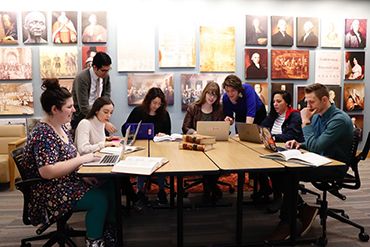Enhancing historical understanding through technology
The Quill project, developed by Oxford historian Dr Nicholas Cole and colleagues, is enabling new insights into the study of some of the key negotiated texts of the modern world.
 Utah Valley University
Utah Valley University(Credit: Center for Constitutional Studies, Utah Valley University)
Using a study of parliamentary manuals and an adaptation of algorithms developed to support multi‐user text editing, Dr Cole has developed a digital platform that recreates the context and timeline of negotiations, and provides interactive visualisations, statistical analysis and search tools. Users are able to engage closely with primary source material, and there are facilities to add comments and record analysis.
Dr Cole explains: “For historians, the database enables a richer understanding of how the text changed during negotiation – who influenced it, at what stage, and what impact this had on the final agreement. For legal and other scholars, it may help them better understand what the writers intended to say, and how the text should be interpreted in today’s contexts.”
To date, Quill has published models of the negotiations that produced the 1787 Federal Constitution, the 1789 Federal Bill of Rights, and the 1895 Utah State Constitution. Projects currently under development include the creation of the XIII-XVth Amendments to the US Constitution, as well as projects examining the development of other US state constituions, Brexit, and comparative constitutional development internationally.
In developing the Quill project, Dr Cole has created an environment in which undergraduate students are able to collaborate with each other and academic mentors on substantive research questions and the production of the digital edition. These opportunities have been particularly successful in engaging students from non-traditional backgrounds, most notably through a partnership with the Center for Constitutional Studies at Utah Valley University (UVU), an open-enrolment university in Provo, Utah.
Dr Cole says: “Using Quill, the students were able to pursue genuine and useful historical research and I am very proud that we were able to partner with them. Now the State Senate is interested in their work and is training its clerks to use the database. The Utah project also directly influenced my own research as it highlighted the importance of studying state-level constitutions which to date have received little attention from scholars.”
The success of the collaboration between UVU and Quill was recognised in January 2020 with the award of a prestigious National Endowment for the Humanities Digital Advancement grant which will expand the project to three further state constitutions. In the words of UVU President Astrid Tuminez, it will be an opportunity to allow more UVU students to “learn and shine” through a “truly groundbreaking” project.
Dr Cole finishes: “The Quill project has been extremely fruitful. It has allowed us to deepen understanding of constitutional government, to focus attention on neglected aspects of American state-level governance, and to build unique academic partnerships with institutions that are very different from Oxford. I am excited to see where we can take the project next.”
Dr Nicholas Cole is a political historian specialising in post-independence America and a Senior Research Fellow at Pembroke College, Oxford
Funders: Partnership agreement with Utah Valley University; National Endowment for the Humanities; Private donations.